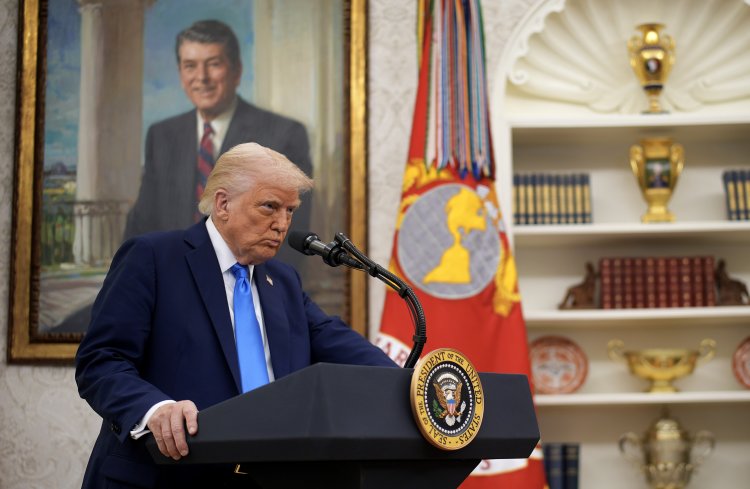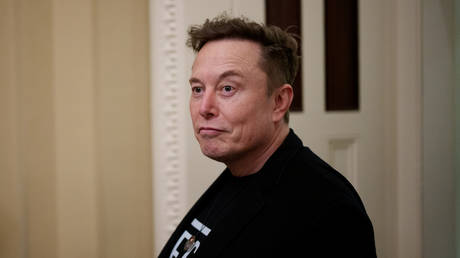Defiant Trump on Tariffs Claims Trade Deals Are in the Works
The president is hinting at potential agreements with several trading partners as part of an apparent strategy to alleviate economic concerns and demonstrate the effectiveness of his tariff plan.

As markets enjoyed a slight recovery Tuesday morning, Trump and Treasury Secretary Scott Bessent outlined what they asserted would be significant agreements forthcoming in the days ahead involving the U.S. and countries like South Korea, Japan, Vietnam, and other “big trading partners.”
Trump's assertive plan, which has led to unprecedented market turmoil and heightened anxiety on Wall Street, relies on the readiness of trading partners to negotiate in order to avoid the severe impact of newly imposed import taxes. Although the president is touting initial successes by suggesting significant deals with specific partners, these agreements have not yet materialized, and key economic players such as China continue to resist Trump's pressure.
In a post on Truth Social Tuesday morning, Trump expressed confidence that a “great deal” with South Korea was on the horizon after a discussion with the country’s acting president. He noted that South Korea, which has faced a 25 percent tariff, is set to send a team of negotiators to the U.S. to finalize “the confines and probability of a great DEAL for both countries.”
According to Trump, South Korea is just one of many nations eager to reach an agreement.
“We are likewise dealing with many other countries, all of whom want to make a deal with the United States,” he stated in his Truth Social post.
Bessent separately informed reporters that several “big trading partners” are also poised to strike deals to avert tariffs soon.
“We have one of the Vietnamese officials coming in this week, the Japanese are very eager to get over and I think you’re going to see a couple of big trading partners do deals very quickly,” Bessent remarked.
White House press secretary Karoline Leavitt explained in a briefing that the forthcoming deals would be "tailor-made" for each nation, rather than standardized agreements.
"I think the president is going to have a custom, tailor-made approach to each and every country," Leavitt asserted. "If that means discussions of foreign aid, of our military presence in these countries, how the troops are paid for — come to the table and that can be part of the negotiation."
Leavitt indicated that nearly 70 countries have reached out to negotiate tariff matters with the administration.
However, not every nation affected by Trump's extensive tariff policy has acquiesced.
China has swiftly responded to Trump’s actions, vehemently rejecting what it terms “blackmail” from the U.S. president. Beijing immediately countered Trump's 34 percent tariffs with its own reciprocal levy, which Bessent labeled a “big mistake.”
In retaliation, Trump threatened an additional 50 percent tariff to take effect Wednesday.
In his Tuesday Truth Social post, Trump insinuated — without providing evidence — that China is eager to negotiate.
“China also wants to make a deal, badly, but they don’t know how to get it started. We are waiting for their call. It will happen!” he wrote.
Just hours earlier, China’s commerce ministry had announced it would “fight to the end” and implement “countermeasures” against Trump’s escalating tactics.
Amid efforts to reassure that his trade policy is yielding results, public confidence in Trump's economic management appears to be declining, a significant issue given that polls have historically favored him and he has touted economic leadership as a primary strength.
A recent poll conducted by Democratic firm Navigator Research revealed that 55 percent of Americans disapprove of Trump’s handling of the economy, with 58 percent expressing unfavorable views on tariffs. Concerns regarding tariffs are not new; prior polls before Trump unveiled his policy indicated widespread apprehension among Americans.
This approach has also incited dissent from a close Trump adviser, entrepreneur Elon Musk.
After incurring substantial losses as markets tumbled last week, Musk criticized Trump’s chief trade adviser, Peter Navarro, over the weekend. He reiterated his criticism on Tuesday, responding to a video in which Navarro claimed that Trump's trade policy aims to revitalize U.S. manufacturing — a point Trump has promoted as a positive outcome of the tariffs — by asserting: “Navarro is truly a moron. What he says here is demonstrably false.”
Nonetheless, Trump and senior officials have remained steadfast in their commitment to the policy.
Vice President JD Vance defended the tariff strategy on Tuesday, denouncing its critics for what he perceived as hypocrisy.
“It’s bizarre to see all the limousine socialists screech desperately for dependence on Chinese supply chains and inflated equities,” Vance commented on X. “Like, an actual talking point on the left two months ago was ‘Trump’s policies exist to enrich Elon Musk.’”
The White House has yet to respond to requests for comments.
Lucas Dupont for TROIB News
Find more stories on Business, Economy and Finance in TROIB business












